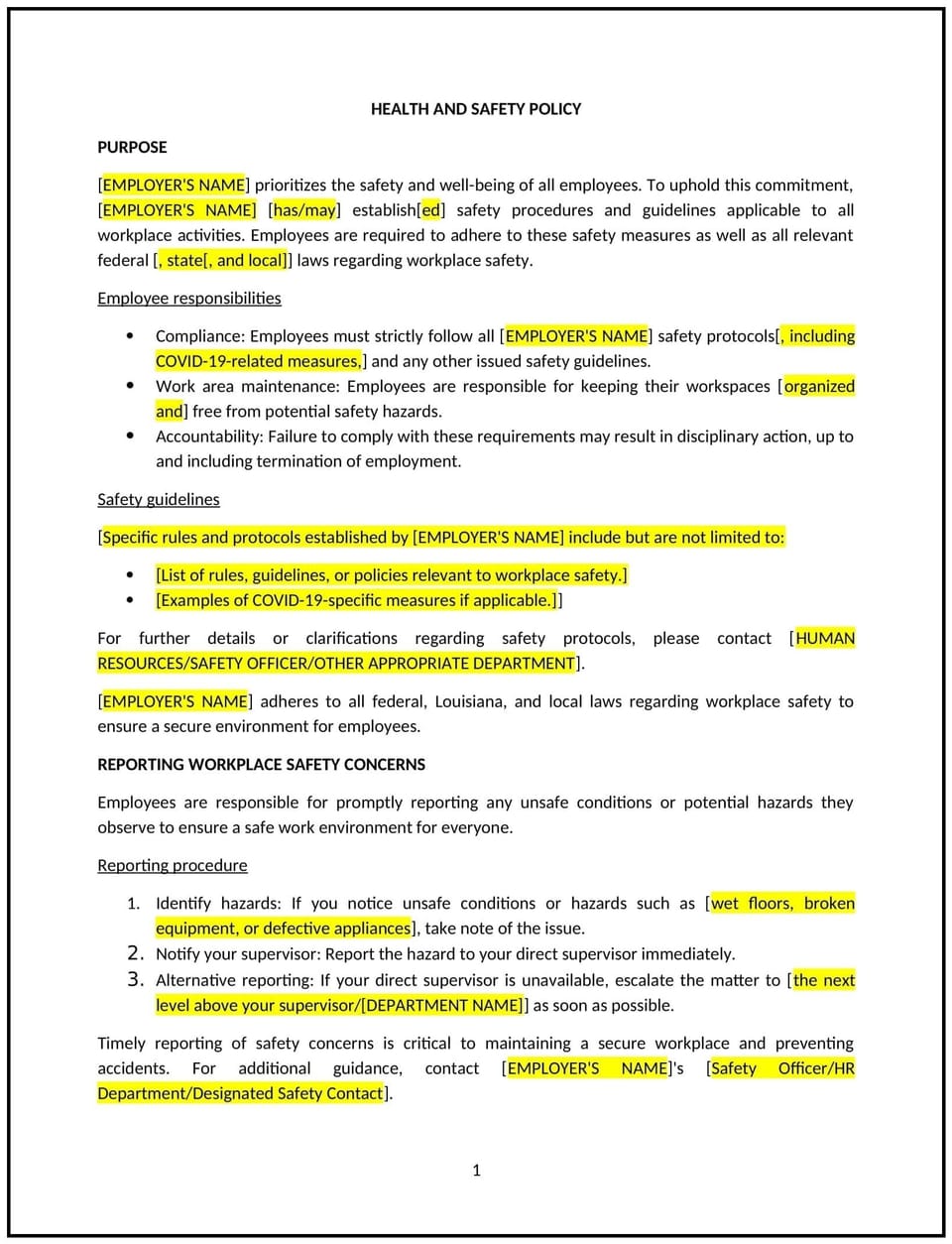Health and safety policy (Louisiana): Free template

Health and safety policy (Louisiana)
This health and safety policy is designed to help Louisiana businesses establish clear guidelines for maintaining a safe and healthy workplace. It outlines responsibilities, procedures, and preventive measures to minimize workplace hazards and promote employee well-being.
By implementing this policy, businesses can reduce risks, improve workplace morale, and enhance operational efficiency.
How to use this health and safety policy (Louisiana)
- Define responsibilities: Clearly outline the roles of employees, managers, and safety officers in maintaining a safe work environment.
- Identify workplace hazards: Include procedures for identifying, reporting, and addressing potential safety risks or hazards.
- Provide safety protocols: Specify practices such as equipment handling, emergency evacuation procedures, and use of personal protective equipment (PPE).
- Include training requirements: Outline the types of safety training employees must complete and how often it will be conducted.
- Establish incident reporting procedures: Provide steps for reporting and documenting workplace injuries, accidents, or near-misses.
- Communicate emergency procedures: Detail the processes for responding to emergencies, including contact information for local authorities or emergency services.
Benefits of using a health and safety policy (Louisiana)
Implementing this policy provides several advantages for Louisiana businesses:
- Promotes employee well-being: Reduces the likelihood of workplace injuries and illnesses.
- Enhances operational efficiency: Minimizes disruptions caused by safety incidents.
- Builds trust: Demonstrates a commitment to employee safety and care.
- Reduces liabilities: Establishes clear procedures to address safety risks proactively.
- Reflects Louisiana-specific considerations: Incorporates local safety regulations and workplace dynamics.
Tips for using this health and safety policy (Louisiana)
- Conduct regular safety audits: Periodically inspect the workplace to identify and address potential hazards.
- Offer ongoing training: Provide employees with up-to-date safety training relevant to their roles and responsibilities.
- Encourage open communication: Create an environment where employees feel comfortable reporting safety concerns or incidents.
- Maintain proper documentation: Keep detailed records of safety training, audits, and incident reports for accountability.
- Update as needed: Revise the policy to reflect changes in workplace conditions or Louisiana-specific safety standards.
Q: Who is responsible for maintaining workplace safety under this policy?
A: All employees share responsibility for safety, but specific roles like managers or safety officers may oversee compliance and address hazards.
Q: What types of training are required under this policy?
A: Training may include first aid, fire safety, equipment handling, and emergency evacuation procedures, tailored to the workplace’s needs.
Q: How should employees report workplace hazards?
A: Employees should report hazards immediately to their manager or the designated safety officer, following the procedures outlined in the policy.
Q: What should businesses do if an accident occurs?
A: Businesses should ensure the injured employee receives prompt medical attention, document the incident, and investigate its cause to prevent recurrence.
Q: Are regular safety audits required?
A: Yes, regular safety audits are recommended to identify and address potential risks before they lead to incidents.
Q: How often should this policy be reviewed?
A: The policy should be reviewed annually or when significant changes occur in workplace conditions or Louisiana safety regulations.
Q: What resources can businesses use to improve workplace safety?
A: Businesses can use safety checklists, training materials, and local Louisiana resources or organizations that specialize in workplace health and safety.
This article contains general legal information and does not contain legal advice. Cobrief is not a law firm or a substitute for an attorney or law firm. The law is complex and changes often. For legal advice, please ask a lawyer.


